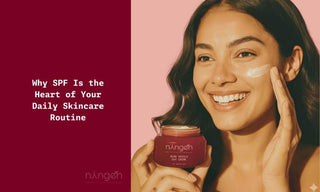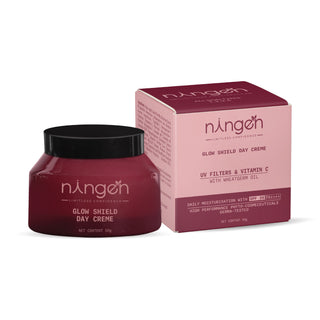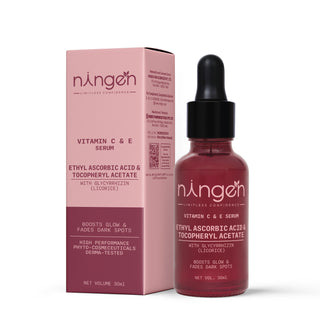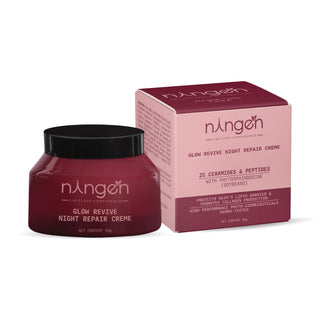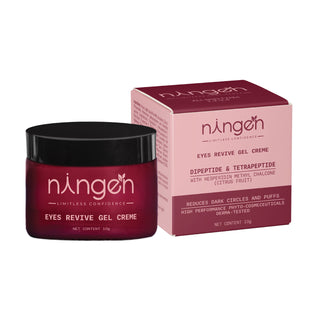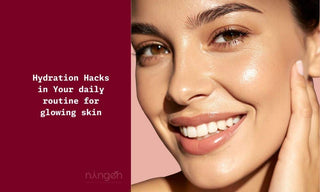TLDR:
Daily SPF is the most important step in your skincare routine. UV rays cause 80% of visible aging, penetrate through clouds and windows, and increase your skin cancer risk by up to 50%. You need at least SPF 30 broad-spectrum sunscreen every morning, about ¼ teaspoon for your face, applied after moisturizer but before makeup. The bottom line? Sunscreen is more effective at preventing aging than any expensive serum or treatment, and skipping it means wasting money on other skincare products that can't work properly without UV protection.
If you're wondering why SPF is the heart of your daily skin care routine, here's a fact that might shock you: 80% of visible skin aging is caused by sun exposure. Not genetics. Not your late-night Netflix binges. The sun. Yet studies show that less than 30% of people wear sunscreen every day, even though dermatologists worldwide agree that daily SPF is the single most important step in any skincare regimen.
Understanding why SPF is essential for your daily skin care routine isn't just about preventing sunburn; it's about protecting your skin from premature aging, hyperpigmentation, and skin cancer. Whether you're a skincare minimalist or a 10-step routine devotee, SPF in your daily skincare isn't negotiable. It's the foundation that makes everything else work.
Let's dive into why dermatologists call sunscreen the most important anti-aging you'll ever put on your face and how to make it an effortless part of your daily skincare routine.
In this Guide;
Why Your Skin Needs Daily Protection?
Why SPF Is the Heart of Your Daily Skin Care Routine
Common SPF Myths That Are Sabotaging Your Skin
How to Choose the Right SPF for Your Skin Type
The Perfect Way to Apply SPF in Your Daily Routine
Why Dermatologists Call SPF the Most Important Anti-Aging Product
The Science Behind SPF: Why Your Skin Needs Daily Protection?
Before we dive deep, let's get clear on what SPF actually means. SPF stands for Sun Protection Factor, and it measures how well a sunscreen protects against UVB rays, the ones responsible for sunburn. But here's where it gets interesting: you need broad-spectrum protection that guards against both UVB and UVA rays.
Think of UVB as the "burning" rays and UVA as the "aging" rays. UVA rays penetrate deeper into your skin, breaking down collagen and elastin, causing wrinkles, sagging, and dark spots that seem to appear out of nowhere. The scary part? UVA rays pass through clouds and windows. That means you're getting hit with aging rays while driving to work, sitting by your office window, or lounging on your couch at home.

Sun damage is cumulative. Every unprotected minute adds up, creating a lifetime tally that your skin will eventually present as premature aging, uneven texture, and increased skin cancer risk. According to the Skin Cancer Foundation, daily SPF use can reduce your risk of developing melanoma by 50% and squamous cell carcinoma by 40%.
Why SPF Is the Heart of Your Daily Skin Care Routine?
SPF acts as your skin’s primary defense system, blocking harmful UV rays that cause invisible cellular damage long before wrinkles, pigmentation, or aging signs become visible. Let's get real about what daily SPF actually does for you:
Prevents Premature Aging Better Than Any Serum
UV exposure breaks down collagen and elastin—the very foundation your actives work to rebuild. Daily SPF use can reduce visible aging by up to 24%, making it the most powerful anti-aging step in your routine.
Maximizes Product Efficacy
SPF shields potent actives like Vitamin C, Retinol, and Niacinamide from UV degradation, ensuring they stay stable and deliver maximum performance.
Maintains Even Skin Tone
Prevents hyperpigmentation, melasma, and dark spots by protecting against UV-triggered DNA damage. Consistent use keeps your complexion bright, balanced, and even.
Protects Your Skincare Investment
Actives such as AHAs, BHAs, Retinol, and Vitamin C can make skin photosensitive. Sunscreen safeguards these results—like putting a roof over your skincare “house.”
Transforms Skincare from Reactive to Preventive
Moves your routine from fixing damage to preventing it entirely, making SPF the smartest, most strategic skincare habit you can build.
Strengthens the Skin Barrier
Reinforces your lipid layer, helps retain moisture, and minimizes inflammation caused by pollution and oxidative stress.
Reduces Skin Cancer Risk
Daily SPF forms the first line of defense against UV-induced DNA damage. While skin cancer is less common in India, protection today prevents long-term cellular harm tomorrow.
Universally Relevant
Works for every skin type, tone, and gender—no exceptions, no excuses. Sun protection is a universal necessity, not a seasonal luxury.
Common SPF Myths That Are Sabotaging Your Skin
Let's bust some sunscreen myths that might be keeping you from proper protection:
Myth #1: "I don't need SPF on cloudy days." Wrong! Up to 80% of UV rays penetrate clouds. Overcast doesn't mean UV-free. Your skin doesn't get a day off, and neither should your SPF.
Myth #2: "My makeup has SPF, so I'm covered." You'd need to apply seven times the normal amount of foundation to get the labeled SPF protection. That's neither practical nor pleasant. Always use a dedicated sunscreen underneath makeup.
Myth #3: "I stay indoors, so I don't need sunscreen." UVA rays stream through windows, damaging your skin while you work, drive, or relax at home. That afternoon glow through your window? It's aging your skin.
Myth #4: "People with dark skin don't need SPF." While melanin provides some natural protection (equivalent to SPF 13), everyone needs sunscreen. Black and brown skin can still develop skin cancer, hyperpigmentation, and premature aging from UV exposure.
How to Choose the Right SPF for Your Skin Type
Not all sunscreens are created equal, and finding your perfect match makes daily application actually enjoyable.
SPF 30 vs. SPF 50: What you really need?
SPF 30 blocks 97% of UVB rays, while SPF 50 blocks 98%. The difference is minimal, but dermatologists recommend at least SPF 30 for daily use and SPF 50 if you'll be outdoors for extended periods. The most important factor? Reapplication every two hours during sun exposure.
Mineral vs. Chemical Sunscreen
-
Mineral sunscreens (zinc oxide, titanium dioxide) sit on top of skin and physically block rays. Great for sensitive skin, works immediately, but can leave a white cast.
-
Chemical sunscreens (avobenzone, octinoxate) absorb into the skin and convert UV rays to heat. More cosmetically elegant, no white cast, but needs 15 minutes to activate.
For Your Skin Type:
-
Oily/Acne-Prone: Look for oil-free, non-comedogenic formulas with a matte finish
-
Dry: Choose hydrating formulas with hyaluronic acid or glycerin
-
Sensitive: Opt for mineral sunscreens without fragrance or alcohol
-
Combination: Lightweight, gel-based formulas work best
Also read in detail: How to choose the right SPF for your skin type?
The Perfect Way to Apply SPF in Your Daily Routine
Here's your step-by-step guide to proper sunscreen application:
-
Cleanse and complete your morning skincare routine (toner, serums, moisturizer)
-
Wait 2-3 minutes for products to absorb
-
Dispense two finger-lengths of sunscreen (about ¼ teaspoon for face and neck)
-
Apply dots across the forehead, cheeks, nose, and chin
-
Blend gently in upward motions, don't forget the ears and neck
-
Wait 15 minutes before makeup or sun exposure
Pro tip: If you're wearing makeup, keep a powder sunscreen or SPF setting spray for midday reapplication without ruining your look.
Why Dermatologists Call SPF the Most Important Anti-Aging Product
Dr. Seemal Desai, a board-certified dermatologist, puts it simply: "If I could only recommend one skincare product, it would be sunscreen. Nothing else comes close to its preventive power against aging and cancer."
Let’s put it in perspective , daily SPF is an investment, not an expense.
A high-quality sunscreen costs about ₹1,200 – ₹3,300 and easily lasts 2–3 months. Now compare that with the cost of reversing sun damage later:
-
Laser treatments for pigmentation or sun damage: ₹42,000 – ₹1,65,000 per session
-
Chemical peels for uneven tone: ₹12,000 – ₹25,000 per treatment
-
Dermal fillers for volume loss and fine lines: ₹50,000 – ₹1,00,000 per syringe
That’s why dermatologists call SPF the most cost-effective anti-aging product ever invented. A few rupees a day today can save you lakhs tomorrow and your future self will thank you for this daily SPF habit. The difference between someone who wears SPF religiously and someone who doesn't becomes strikingly visible by their 40s and 50s.
Also read: How to apply sunscreen properly for maximum protection.

The Bottom Line: Your Skin Deserves This One Simple Act of Care
SPF isn't about perfection, it's about protection. It's about giving your skin a fighting chance against the environment. It's the easiest, most effective anti-aging strategy that exists, and it costs less than your monthly coffee habit.
Start tomorrow morning. Make it as routine as brushing your teeth. Your skin is counting on you to show up for it every single day, rain or shine.
Because here's the truth: you can have the most expensive serums, the trendiest treatments, and the perfect 10-step routine. But without SPF, you're building a house on sand. Make sunscreen your foundation, and everything else will work better.
Frequently Asked Questions
1. Do I really need to wear sunscreen every day, even indoors?
Yes, you should wear sunscreen daily, even indoors. UVA rays penetrate through windows and can cause cumulative skin damage, premature aging, and increase skin cancer risk. Studies show that up to 50% of UV radiation can pass through glass, making indoor SPF protection essential for maintaining healthy skin.
2. What's the difference between SPF 30 and SPF 50?
SPF 30 blocks approximately 97% of UVB rays, while SPF 50 blocks about 98%. The difference is minimal, but SPF 50 offers slightly longer protection. Dermatologists recommend at least SPF 30 for daily use, with proper reapplication being more important than the SPF number itself.
3. Can I skip sunscreen if my moisturizer or makeup has SPF?
No, makeup and moisturizer with SPF typically don't provide adequate protection. You'd need to apply 7 times the normal amount of foundation to get the labeled SPF protection. Always use a dedicated broad-spectrum sunscreen as a separate step in your skincare routine for complete protection.
4. How much sunscreen should I apply to my face?
You should apply approximately ¼ teaspoon (about two finger-lengths) of sunscreen to your face and neck. This ensures you're getting the full SPF protection listed on the bottle. Most people apply only 25-50% of the recommended amount, significantly reducing effectiveness.
5. When should I apply sunscreen in my skincare routine?
Apply sunscreen as the last step in your morning skincare routine, after cleanser, toner, serums, and moisturizer, but before makeup. Wait 2-3 minutes after moisturizer to let it absorb, then apply sunscreen and wait another 15 minutes before sun exposure or applying makeup.
6. Does sunscreen prevent wrinkles and aging?
Yes, daily sunscreen use is the single most effective anti-aging product. Studies show that regular SPF use can prevent up to 80% of visible signs of skin aging, including wrinkles, fine lines, and age spots. UV exposure breaks down collagen and elastin, the proteins that keep skin firm and youthful.
Disclaimer: This article is for informational purposes only and does not constitute medical advice. Consult with a board-certified dermatologist for personalized skincare recommendations.
While you can use the same product, facial sunscreens are formulated to be more cosmetically elegant, less likely to clog pores, and better suited for wearing under makeup. Facial formulas are worth the investment for daily comfort.
References & Further Reading


